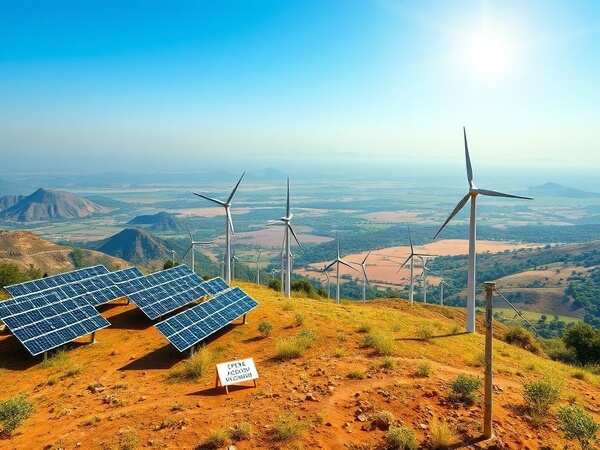The cabinet also said that India is on track to fulfil its commitments under the 2021 United Nations Climate Change Conference (COP26), held in Glasgow. India has surpassed its target of installing 50% of its power capacity from non-fossil fuel sources, achieving a key nationally determined contribution (NDC) under the Paris Agreement five years ahead of the 2030 target, the Union Cabinet said on Wednesday.
“India’s achievement of 50% non-fossil fuel installed capacity ahead of the target year is a testament to its ambition, innovation, and commitment to sustainable development. It affirms that development and decarbonisation are not contradictory goals, but can in fact reinforce each other. As the country moves toward the goal of 500 GW of non-fossil capacity by 2030 and net-zero emissions by 2070, the path forward must be bold, inclusive, and technology-driven,” union minister of new and renewable energy Pralhad Joshi said on July 14.
India’s updated NDCs under the Paris Agreement, submitted in August 2022, said that the country aims to reduce the emissions intensity of its gross domestic product (GDP) by 45% by 2030 from 2005 levels; increase the share of non-fossil fuel-based energy resources to 50% of its installed power generation capacity by 2030; and create an additional carbon sink of 2.5 to 3 billion tonnes of CO2 equivalent through additional forest and tree cover by 2030.
According to data from the ministry of new and renewable energy, India’s total power capacity as of June 30 was 484.8 GW, with 242.04 GW (49.92%) from thermal/coal, 8.78 GW (1.81%) from nuclear, and 234.00 GW (48.27%) from renewable sources, including large hydro.
The cabinet also said that India is on track to fulfil its commitments under the 2021 United Nations Climate Change Conference (COP26), held in Glasgow. Addressing a gathering that included over 120 heads of state at COP26, Prime Minister Narendra Modi had said India would increase its non-fossil fuel energy capacity to 500 GW by 2030, fulfil 50% of its energy requirements from renewable sources by 2030, reduce its total projected carbon emissions by 1 billion tonnes between now and 2030, reduce the carbon intensity of its economy by 45% by 2030, and achieve net-zero emissions by 2070.
“As a commitment made to the Paris Agreement, the achievement of India’s NDC target is commendable and signals its intent to diversify its energy mix whilst continuing to tackle growing power demand. Having achieved this, all efforts must now be directed to raise the actual share of generation from renewables (combined with storage) in the power mix—which currently stands at 13% for solar and wind—to displace coal,” programme manager for climate change at the Centre for Science and Environment, Avantika Goswami, said.
The cabinet committee on economic affairs, chaired by PM Modi, has granted enhanced delegation of powers to the National Thermal Power Corporation (NTPC) Limited, beyond the existing guidelines for Maharatna central public sector enterprises (CPSEs). This will allow NTPC to invest in its subsidiary, NTPC Green Energy Limited (NGEL), and enable NGEL to further invest in NTPC Renewable Energy Limited (NREL) and its other joint ventures and subsidiaries. The investment limit was raised from the earlier approved ₹7,500 crore to up to ₹20,000 crore for renewable energy capacity addition, in line with the goal of achieving 60 GW of renewable energy capacity by 2032.
“The enhanced delegation given to NTPC and NGEL will facilitate accelerated development of renewable projects in the country. This move will also play a vital role in strengthening power infrastructure and ensuring investment in providing reliable, round-the-clock electricity access across the nation,” a statement issued on the Cabinet decision said.
The cabinet has also approved a special exemption for NLC India Limited (formerly Neyveli Lignite Corporation India Limited or NLCIL) from the prevailing investment guidelines applicable to Navratna CPSEs. This enables NLCIL to invest ₹7,000 crore in its wholly owned subsidiary, NLC India Renewables Limited (NIRL), and in turn, NIRL can invest in various projects directly or through the formation of joint ventures, without the requirement of prior approval under the existing delegation of powers.
“This investment is further exempted from the 30% net worth ceiling stipulated by the department of public enterprises (DPE) for overall investment by CPSEs in JVs and subsidiaries, providing NLCIL and NIRL greater operational and financial flexibility,” the statement said.



